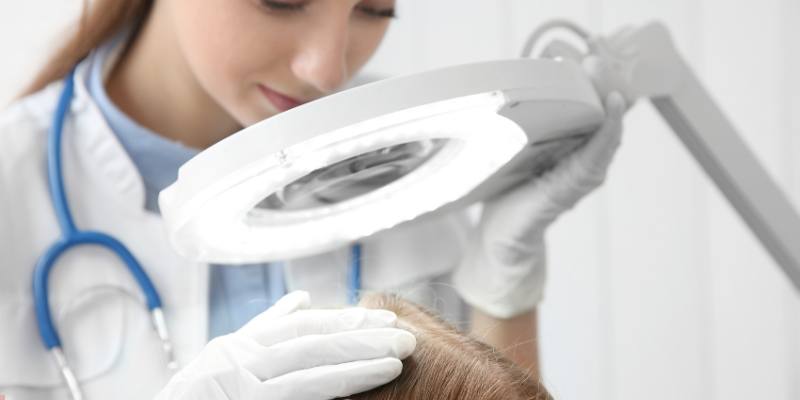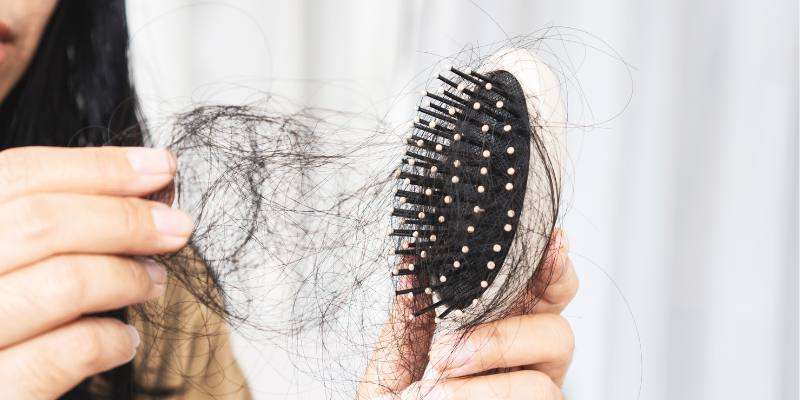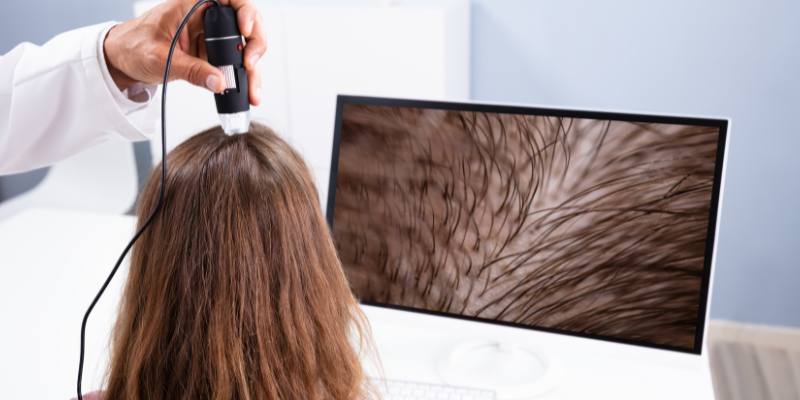Can a dermatologist help me with hair loss?
This is a typical question we receive from potential patients.
Patients consult dermatologists for skin disorders such as acne, dermatitis, and skin cancer. However, your dermatologist can address all of your hair and nail concerns. Hair loss is the most prevalent and severe hair condition.
Over 55 million Americans have some degree of hair loss.
Many people dismiss the issue or are ignorant of the excessive shedding. Others let it run its course before shaving it all off or covering it up with haircuts, wigs, or hats.
However, for some, the issue may be stressful, emotionally damaging, and have an impact on their everyday life.
At this stage, combating hair loss requires more than just buying shampoo or an over-the-counter therapy. You'll need to see your dermatologist to determine the underlying problem so that you may take a holistic approach to regrowing your whiskers as soon as possible.
Let’s learn more about the role of a dermatologist in hair loss.

What Is Hair Loss/Alopecia?
Alopecia is a skin condition that causes hair loss on the scalp, face, and body.
There are several kinds of alopecia, including:
- Alopecia Areata leads to isolated, circular bald spots on the scalp.
- Central Centrifugal Cicatricial Alopecia (Ccca) leads hair to thin outward from the crown of the head.
- Lichen Planopilaris produces thinning hair or bald patches, as well as itchy, scaly skin. It may cause irreversible hair loss.
- Androgenetic Alopecia causes the hairline to recede, as well as hair loss on the top and front of the head.
- Telogen Effluvium is a condition that causes temporary hair loss, usually as a result of stress or trauma.
What are the Causes of Hair Loss?
Hair loss happens to people of all ages, genders, races, and ethnicities.
It can begin in infancy.
Several reasons can lead to hair loss, including:
- Autoimmune Disease: For unexplained reasons, the immune system erroneously assaults healthy hair follicles, preventing hair growth.
- Genetics: Genes play a little influence in alopecia. The majority of children with alopecia do not have a parent with the disease. Most parents with alopecia do not pass on the condition to their children.
- Hair Products: Women who use oils that are hot and chemical relaxants may be more vulnerable to CCCA. These hair products can irritate the scalp and induce hair follicle scarring, which inhibits hair growth.
- Hairstyles: Pulling on hair repeatedly to produce specific hairstyles might cause hair follicle damage. This disorder, known as traction alopecia, is more frequent among Black women.
- Hormones: The androgen hormone controls hair growth in both women and men. People with high levels of androgen may have fast hair loss. Others have a defective androgen receptor gene, which causes androgenetic alopecia. Men with this defective gene get male-pattern baldness, whereas women have thinning hair.
- Nutritional Deficiencies: A diet low in key vitamins and minerals may impair hair development.

What Can a Dermatologist Do for Hair Loss?
It may surprise you, but when you're losing hair, they're the folks you should look for in your neighborhood.
You may think of dermatologists as "skin doctors" and believe they can only help with your complexion or other skin problems, not hair loss.
However, hair follicles are situated in the skin, and the two are undoubtedly connected. Dermatologists specialize in hair, skin, and nails, but if you've begun suffering hair loss or thinning, you're probably wondering if they can help.
We will discuss why you should see a dermatologist for hair loss, as well as how they'll diagnose it and provide treatments.
But first, let's answer your most important question: can they help?
Can a Dermatologist Help with Hair Loss?
Dermatologists are also hair specialists, and they are the most qualified medical professionals for the task.
A dermatologist often spends more than a decade in school, studying all sorts of scientific things, including how to diagnose and treat various skin and, yes, hair diseases, making them ideal for the position.
According to the American Academy of Dermatology, your dermatologist completed four years of undergraduate studies, four years of medical school, one year as an intern, and at least three years as a dermatology resident.
So, yes, they have learnt a few things along the road, including how to help you with hair loss.
A dermatologist can precisely treat your hair and can:
- Determine what causes your hair loss.
- Diagnose the condition and determine what type of hair loss is occurring.
- Recommend the best course of therapy or send you to another doctor for hair loss.
How Do Dermatologists Diagnose Hair Loss?
A dermatologist's initial priority is to discover the cause of your hair loss.
When you visit a dermatologist to diagnose hair loss, they will conduct the following:
Ask some questions.
You'll usually be questioned about your medical history, any medications you're taking, your lifestyle, and how your hair loss has developed over time—is it new, or has it been steadily worsening?
They will also ask questions about your age.
Male pattern baldness is more common as you get older, so while you may notice hair loss in your 20s or 30s, the probability of experiencing it grows with each decade.
Perform a physical examination of your scalp.
They may also examine other regions of your body to see whether the hair loss is limited to your head.

Run a few tests.
A dermatologist may pull on your hair to determine its health and fragility.
This is referred to as a creative hair pull test. They may also do a "card test" to determine your hair density and form of your hair strands.
Your dermatologist may offer blood tests, scalp biopsy, trichoscopy, or other examinations to rule out hormonal imbalances, mineral and vitamin deficiencies, as well as other illnesses and medical problems that might cause hair loss.
Order more testing if required.
These may involve drawing blood to check for iron deficiency (anemia) or thyroid issues, obtaining a fungal culture to search for a fungal infection, or performing a scalp biopsy (also known as a punch biopsy) to collect a sample of your scalp.
Your doctor may also search for indications of ringworm, which can lead to a tinea capitis diagnosis.
They'll also explore hormonal changes, steroid usage, high blood pressure, and other conditions that might be indirectly related to hair loss or shedding.
All of these will help the healthcare expert determine what is causing your hair loss and, as a result, what your diagnosis is.
Dermatologists Write Prescriptions for Cranial Prosthesis
Dermatologists play an essential role in helping individuals experiencing hair loss by prescribing medical-grade wigs, also known as cranial prostheses.
When a dermatologist prescribes a cranial prosthesis, it opens the door for patients to receive coverage from their insurance companies, alleviating financial concerns.
Many Wig Medical clients are surprised and relieved that their health insurance might cover most of the cost.
Our team can check if your insurance pays for your medical wig for piece of mind.
So, if you're facing hair loss, consulting with your dermatologist can be the first step towards regaining your hair and your zest for life, knowing there are supportive measures in place to help you look and feel great again.

Most Common Treatment Options For Hair Loss
Your dermatologist will address the underlying reason for your hair loss, which might be medication, hormone imbalances, thyroid condition, or nutrition.
To help reduce hair loss, it is typically sufficient to address the underlying issue.
Most hair loss therapies are intended to help with androgenic alopecia (male and female pattern hair loss).
Treatments include:
- Medication: Over-the-counter drugs applied to the scalp (such as minoxidil or Rogaine®) are typically the first line of therapy for thinning hair. Finasteride, often known as Propecia®, is a prescription oral drug approved specifically for males who have male pattern baldness.
- Hair transplant: During a hair transplant, your physician gently pulls strands of hair from the thickest section of your scalp. The physician then implants those strands into your scalp, where your hair is weakest.
- Platelet-rich plasma (PRP): After extracting your blood, the doctor isolates the plasma. They then inject the platelet-rich plasma into your scalp. PRP therapy can help slow down hair loss and promote new hair growth.
Lifestyle Changes Can Also Help
Certain life events, habits, and situations may contribute to your hair loss.
The idea would be to identify these challenges and figure out how to address them. When this occurs, hair follicles should respond naturally.
Some of these modifications include:
- Check Your Hairstyles: Tight hairstyles and certain hair products can make your hair fall out.
- Watch Your Hair Products: Some chemicals in hair relaxers can hurt your hair and make it hard for new hair to grow.
- Reduce Stress: Stress can make your hair fall out, so try to relax and find ways to be less stressed.
- Eat Healthy: Eating foods with vitamins and minerals like iron and zinc can help your hair grow better. Eat lots of leafy greens, veggies, and whole grains for a healthier body and hair.
- See a Dermatologist: A dermatologist can help you with advice, medicines, and treatments to stop your hair from falling out.
Sometimes, if your hair loss is causing you stress or discomfort, a dermatologist might recommend using wigs or toppers. These are like hairpieces that you can wear to cover up any areas where your hair is thinning or where you have bald spots.
Medical Wigs and toppers come in many different styles, colors, and lengths, so you can choose one that matches your natural hair or try out a whole new look if you want!
Hair loss can often cause depression in patients, but not anymore. You can feel confident when wearing a wig or topper.
They can also give your hair a break from styling or treatments that might be causing further damage.
Wigs are easy to use - you just put them on like a hat and you're good to go!
So, if you're feeling self-conscious about your hair loss, reach out to Wig Medical's for the best wigs and toppers.

